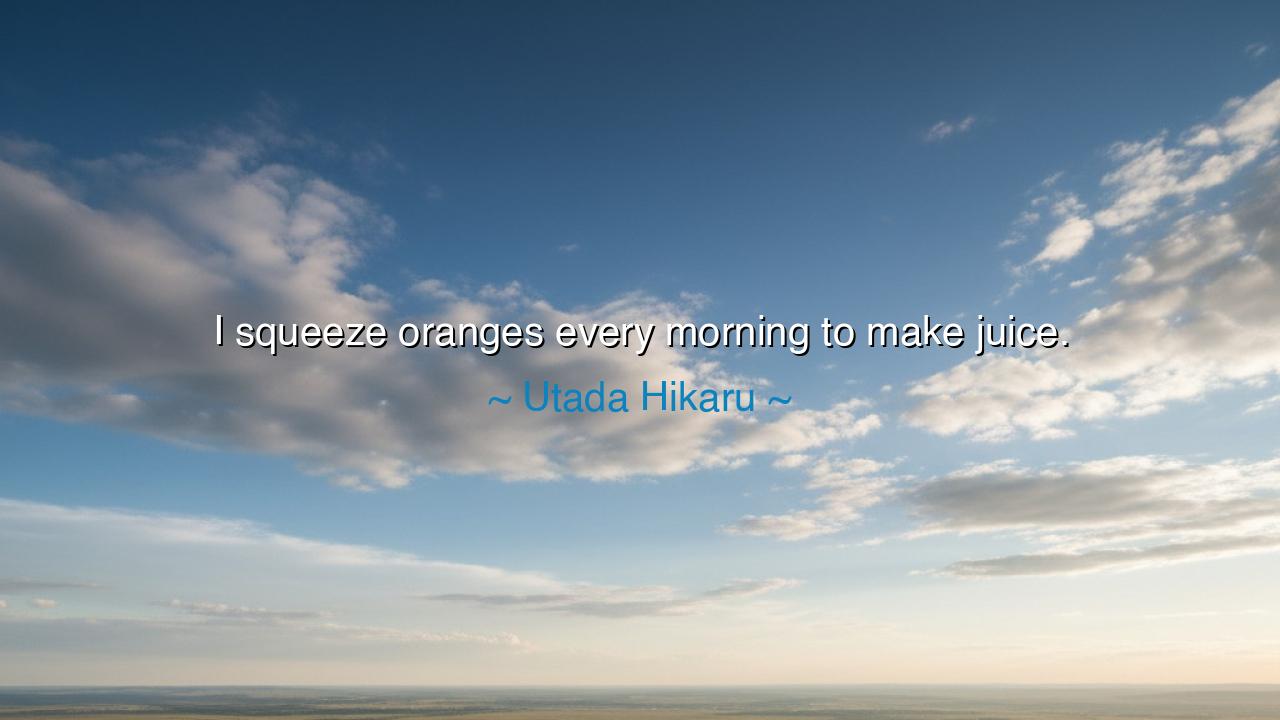
I squeeze oranges every morning to make juice.






The words of Utada Hikaru seem at first simple, almost childlike: “I squeeze oranges every morning to make juice.” Yet within such simplicity lies a profound truth about the nature of life, of habit, and of discipline. For to rise with the dawn and begin the day by one’s own hand, pressing fruit into drink, is not only an act of nourishment but of intention. It is to say: “I will not let the world dictate my morning; I will create it with my own labor.” In these few words we hear the whisper of an eternal lesson—life’s sweetness is not found ready-made, but pressed forth through effort.
The squeezing of oranges is more than a ritual of health; it is a symbol of transformation. The fruit, whole and silent, gives nothing until it is broken, pressed, and released. So it is with the gifts of the world. Joy, wisdom, strength—all remain dormant until we labor to draw them forth. Hikaru’s morning act reflects this deeper truth: that nothing of value comes without effort, that the elixir of life flows only when we place our hands to the task. The ancients too knew this, for the farmer who would eat must plow, the warrior who would win must train, and the poet who would sing must wrestle with words.
There is also humility in this saying. She, an artist celebrated by millions, does not begin her day in idleness or indulgence, but in the quiet labor of the hand, pressing fruit for her own sustenance. This recalls the philosophers of old who, though renowned, still chose to live simply, binding their greatness with humility. Socrates, who refused riches, drank from a simple cup; Seneca, though wealthy, taught the power of austerity. Thus does Hikaru’s juice-making stand as a reminder: greatness is found not in luxury, but in fidelity to small, honest acts.
Consider, too, the example of Mahatma Gandhi, who each day spun thread upon his charkha. Though he could have left such labor to others, he chose it as his discipline, a daily act of independence and simplicity. In his spinning, as in Hikaru’s squeezing, there is a lesson: that the small daily task is not beneath us—it is the foundation upon which freedom and strength are built. To take time each morning for such work is to claim ownership of one’s life.
The morning ritual is the seed of the day. If it begins in haste and carelessness, the hours that follow grow tangled and unsteady. But if it begins with calm intention, with the hands at work and the spirit awake, then the day unfolds with clarity. To squeeze oranges each morning is to declare, “I will shape my life with patience, I will draw sweetness from effort.” It is no mere drink—it is a vow renewed with each sunrise.
From this saying flows a practical command: let each soul choose a morning act that roots them in discipline and simplicity. It need not be oranges—it may be the sweeping of a floor, the tending of a garden, the writing of a page, or the lifting of the body in exercise. What matters is not the form, but the constancy, the intentionality. For such rituals guard the mind from drift and the body from decay. They are anchors in the storm of time.
Thus, children of tomorrow, remember this: the juice of life does not pour itself; it must be drawn forth. Do not begin your days in passivity, waiting for sweetness to arrive. Instead, put your hands to work, however small the labor, and taste the fruits of your own effort. For in this lies not only nourishment of the body, but strength of spirit and clarity of mind.
And so the wisdom of Utada Hikaru, veiled in simplicity, shines forth: “I squeeze oranges every morning to make juice.” Take it as a parable of effort, discipline, and renewal. Begin your mornings with purpose. Let your hands work before your heart wanders. Transform what is whole and dormant into what is flowing and alive. In this way, you too will find the sweetness that sustains life—not by chance, not by waiting, but by the eternal truth of effort made each dawn.






AAdministratorAdministrator
Welcome, honored guests. Please leave a comment, we will respond soon